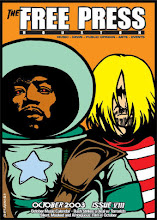Invictus

Some Clint Eastwood films you can take or leave, then there are some Eastwood films that take hold of you. Not unlike another recent Warner Brothers release The Blind Side, Invictus functions both as a sports film and a social issues film. Invictus offers some very inspirational insights and a strong moving lead performance by Morgan Freeman as Nelson Mandela. Eastwood has made a film as 180-degree different from Gran Torino as one could ever imagine.
Mandela has just been released from prison after being jailed for nearly three decades as a political prisoner in South Africa at the movie's beginning. Soon elected President, Mandela urges his staff to err on the side of forgiveness rather than revenge. The general consensus of the new staff as well as the South African sports commission is that the rugby team, the Springboks, should be disbanded. Mandela in his wisdom wants to use the team as a linchpin to unite the country torn by apartheid by winning no less than the Rugby World Cup. Since the team will barely make the playoffs the conflict and challenge of Invictus is quite clear.
The title Invictus is Latin for unconquered. The title also comes from a poem by William Ernest Henley (published in 1875). At one point in the movie Mandela references the poem while talking to Springboks captain Francois Pienaar (Matt Damon more sports hunk than trim spy). Later Pienaar visits the island where Mandela was imprisoned and we hear the words spoken over images as Pienaar stands in a cell that barely exceeds the width of his outstretched arms.
Eastwood has cinematic fun with this sequence. Likewise he sets up a couple of other scenes as if there's about to be an attempt on Mandela's life. One involves a van and the other a jet airliner. The humor is there as the danger proves to be something else. There's also a sly sense that Eastwood is manipulating the audience with the ease of someone who's been making films since the 50s.
The theme of forgiveness never seems mawkish and the drama extends to members of Mandela's staff whom we see dealing with their own issues. After a while it becomes apparent that the film has nowhere else to go but to witness the final game of the 1995 Rugby World Cup in an, at times, exhilarating act that lasts over a reel.









0 Comments:
Post a Comment
<< Home